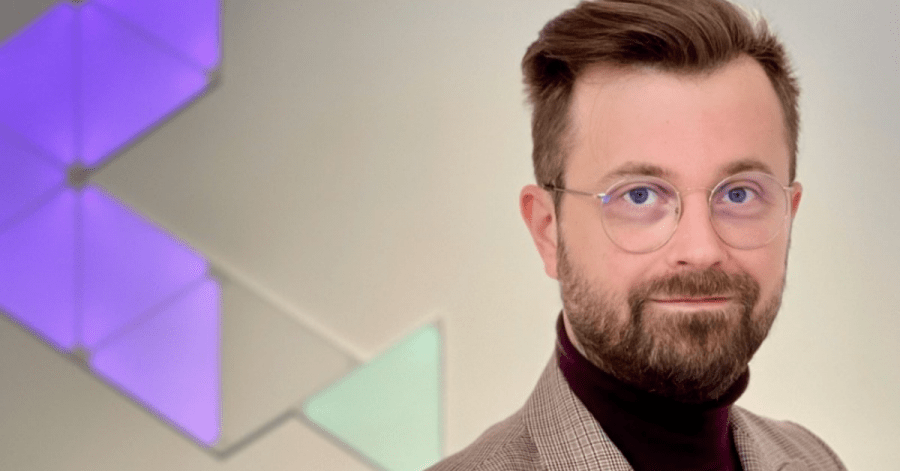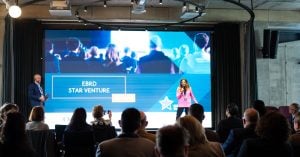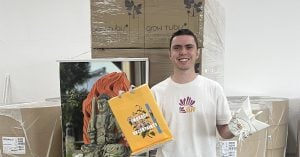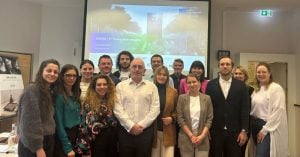There’s a lot of talk around the circular economy lately but one key takeaway for companies and consumers alike is that it can make you more agile. Liviu Huluta, founder and CEO of INKI, a B2B platform that rents electronic devices such as laptops and phones, together with a pool of services such as insurance and security, explains:
“We actually had this feedback from companies: we buy these devices and use them until we squeeze all the value out. But we don’t, we actually lose value.
We get more value by being agile, by having the latest gear, and not producing waste all the time. We’re giving people the flexibility and the freedom to shift their businesses, to pivot as much as they want, to switch from Windows to Mac OS, or from iOS to Android, anytime they want.”
Circular economy presents a €1.8 trillion economic opportunity by 2030. Two of the key principles in the model are the elimination of waste and pollution, and circulating products and materials at their highest value.
In Romania, INKI is bringing the advantages of the circular economy into the consumer tech sector, with focus on electronic equipment for offices, such as phones, tablets, and laptops. Business customers can rent the devices, together with a bundle of services such as insurance and data security, for a monthly fee, and upgrade them after the minimum contractual period.
In this interview for The Recursive, CEO Liviu Huluta shares more about:
- How device-as-a-service can help companies achieve better device management;
- Why now was the right time to launch a circular electronics model in Romania;
- The company’s funding and development plans.
The Recursive: Walk us through the beginnings of the company. How did you get started?
Liviu Huluta: One of the main aspects of us getting started was having a team with experience in managing devices at scale. We know where the market has been, where it is, and we can anticipate its future.
I come from the insurance industry, namely device insurance. In my previous job, I helped set up and manage most of the device insurance programs that you see around Central and Eastern Europe. I started with Vodafone 12 years ago, and then we scaled to other big names like Telekom, Orange, or Telenor, across these countries in CEE. So, we knew the risks associated with smart devices.
Then our Chief Operating Officer, Karoly Kiss, based in Budapest, set up and ran the service centers for managing devices for many big telcos and consumer tech companies, from Deutsche Telekom, to Nokia, Sony, and iStyle.
Our other co-founder, Cristian Darie, is the former Chief Technical Officer of Okazii.ro. Then he moved to London to found a startup, and worked with a few others. He is now our CTO, with extended experience and responsibility in user experience and how we interact with our clients.
Finally, Andrew Shailer Smith joined INKI as Chief Financial Officer, adding great value in developing the business model and the complex financial modeling needed to transform assets into services. He has experience in the large corporate world and as a serial entrepreneur in both London and Paris.
Together, we saw what was ultimately a giant waste in device management. We saw people use devices until they drop, and then the device ends up in a drawer. And if you look at the measurements, each device generates around 80 kg of CO2 equivalent. It is a source of pollution.
What’s more, it is an economic waste. The devices that ended up broken or drawers are worthless; you’re not keeping them going, you’re not making the best use of them.
INKI Tech is not a business that goes against the movement of capital but against waste.
How does INKI Tech address the issue of electronic waste?
We rent devices for a determined period and take them back at the end of one cycle in order to salvage and reintroduce them in the loop. The devices go through a refurbishment process and are then put back on the market.
Less than 20% of the companies in Europe have a proper recycling refurbishment process in place for their devices. So, most companies don’t do anything about it.
Yet Europe is basically running out of copper, which is a core material in these devices. We’re importing it from devices from China or Africa, and then dump the devices in landfills that may end up back to China or Africa. Why? Because people are not bothered to do something about it.
And we’re providing that incentive, by also adding some services on top like insurance in order to make it worthwhile to go through the circular economy.
“Ultimately, it’s your life that should be your focus, your progression; you don’t want to be tied down by stuff.”
Why was now the right moment for this type of service in Romania?
We saw a market shift in the telecom sector which is very interesting. It started in the West and is now coming our way. Think of big telcos: they used to push device sales through subscriptions. You never really saw the full price of a device. It was sort of bundled into a plan.
Well, this is shifting because of market and regulatory pressures. So, telcos have to be more transparent about the cost of the device. This shift in the market makes it worthwhile for INKI to push with a device-as-a-service model.
If customers were comparing our service to bundled plans, we would appear a little bit more expensive. But now, once they see the true installed cost, we are all of a sudden a lot more competitive.
Also, it’s a big enough market and we see a lot of traction in mainly new companies, growth companies, and the fact that we are based and active in CEE, we see a key benefit for us tackling these companies that are aiming for growth.
How is the circular model for electronic devices financially viable?
At INKI, what we’re doing is maximizing residual value. So, instead of buying a laptop and using it for five years, and then rendering the laptop worthless, we’re incentivizing people to use it for two years, after which we do refurbishment and increase the residual value.
So, let’s say a laptop is worth 1000 euros and instead of dropping to 100 euros in value, it only goes to 300-400.
That difference is what we use to pump back value into the market by providing customers with free insurance, accidental damage, and loss, and then we can also offer them very flexible contracts.
We use a lot of data to know the exact value of the device at every given moment. Even the movement of capital is somewhat circular because we have waited to the end in order to pump the value back into the chain.
What comes next in terms of funding and expansion plans?
So, we built an MVP, talked to a few potential clients, onboarded them, and they started talking about us.
Our business is rather capital-intensive, so we had to secure debt financing, which we did first last year.
And then because we still have operational expenses and we cover 10% of the value of the devices, we had to do an angel round, which we are currently finalizing. We will use the pre-seed money to experiment a little bit with marketing automation, drill down into the cost of acquisition, and see how we can make our onboarding as efficient as possible.
We will do a proper seed round sometime this year.
. . .
>>>If you want to read more on the topic of circular device management, check out our analysis of the refurbished phone market in Romania or read about the recent fundraising round of Addit Tech, a device-as-as-service marketplace in Bulgaria. <<<








